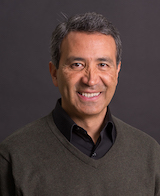Breadcrumb
The goal of the NextGen Cardiovascular, Muscle & Metabolism Science Seminar is to highlight transdisciplinary precision research taking place in cardiovascular, muscle and metabolism fields; provide opportunities for collaboration among researchers to build their own research efforts; and promote clinical/researcher activity across the University of Missouri System and our partners.
For questions about this event, please reach out to Veronica Lemme lemmev@health.missouri.edu.
"Mechanistic Roles of the Glycocalyx and Cytoskeleton on Arterial Stiffening"
Speaker: Luis Martinez-Lemus, DVM, PhD, Professor, James O. Davis Distinguished Professorship in Cardiovascular Research, Medical Pharmacology & Physiology, University of Missouri
Date: May 8, 2023, noon-1 p.m.
Description
Hardening of the arteries, also known as arterial stiffening, is a common characteristic of many cardiovascular diseases. Stiffer arteries have a reduced capacity to expand and increase their diameter as the heart pumps blood through the circulatory system. This increases vascular resistance and causes central blood pressure to be propagated into the smaller arteries inside the organs, thus contributing to hypertension development, aneurysm formation, stroke and end-organ damage. The prevailing idea of how arteries become stiffer is that changes in the characteristics and composition of the extracellular matrix (ECM) make blood vessels less distensible. However, recent findings from multiple laboratories, including Dr. Luis Martinez-Lemus’s, have challenged that paradigm and consider the structural and mechanical properties of cells within the vascular wall, including the glycocalyx and cytoskeleton of vascular smooth muscle and endothelial cells, as major drivers of vascular stiffening, hypertension and cardiovascular disease progression.
About the Speaker
Dr. Martinez-Lemus' research is broadly focused on cardiovascular and metabolic disorders with an emphasis in vascular remodeling and the geometric reorganization of wall components in blood vessels. Vascular remodeling plays an important role in numerous physiological and pathological phenomena, from vasculogenesis and angiogenesis to vascular stiffening and arteriosclerosis. It particularly plays a preponderant role in the incidence of life-threatening cardiovascular events associated with obesity, hypertension, diabetes and aging. His experience in this area of biomedical science is extensive. Dr. Martinez-Lemus has a long history of performing research investigating the mechanisms that promote specific functional and structural changes in all components of the vascular wall. He has been continuously funded by intramural funds from the American Heart Association, the National Science Foundation, the National Institutes of Health and industry to perform cardiovascular research from his postdoctoral years to the present day. Dr. Martinez-Lemus' research has provided the foundation of current paradigms in vascular stiffening and remodeling that indicate structural and mechanical changes in vascular smooth muscle cells, endothelial cells and the vascular extracellular matrix are essential in the early stages of the remodeling process.